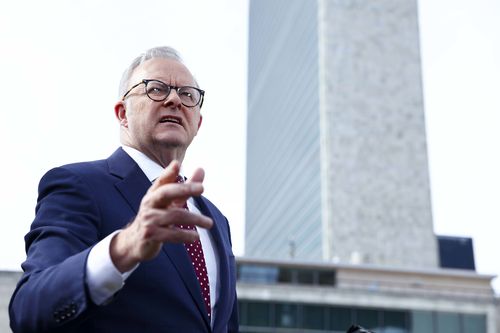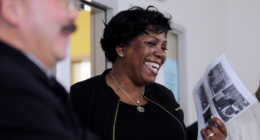Share this @internewscast.com
The Australian Prime Minister, Anthony Albanese, addresses global leaders by advocating for the formal recognition of a Palestinian state. He argues that this step could break the “cycle of violence” and offer Palestinians hope for establishing a homeland.
Albanese is scheduled to speak at the UN General Assembly in New York shortly after Australia’s official recognition of a Palestinian state. “Together, we can envisage a future where children in Gaza are safe, educated, and free from fears, able to build their own peaceful lives,” he plans to convey on Tuesday morning AEST.

“That future depends on recognition being followed by reconstruction and reform.”
“We join with our allies and partners in calling for the hostages to be returned immediately and with dignity,” he will say.

“It will not happen,” he said. “A Palestinian state will not be established west of the Jordan River.”
Australia’s move took formal effect on Sunday night alongside the United Kingdom and Canada.
In a statement, Albanese emphasized that these announcements are components of an international initiative to rejuvenate the momentum toward a viable two-state solution.
Meanwhile opposition leader, Sussan Ley says she has told Israel’s Foreign Minister, Gideon Sa’ar of her “disappointment” over Albanese’s move.
However, he expressed disappointment over the deviation from bipartisanship and reaffirmed the Coalition’s stance that recognition should only occur at the conclusion of an authentic two-state negotiation process, as reflected in a tweet.
“Now is the wrong time while Hamas holds hostages and while conflict still rages.” she said.

Almost 150 nations recognise Palestinian state
Joining this movement, the UK and Canada have also recognized a Palestinian state, aligning with nearly 150 other countries. France, too, is expected to announce its recognition at the General Assembly.
Portugal also joined the group, announcing its recognition later on Sunday from New York.
France and Saudi Arabia aim to leverage the assembly and the grave situation in Gaza to bring renewed focus and urgency to pursuing a two-state resolution to the Israeli-Palestinian conflict.

But the efforts to push a two-state solution face major obstacles, beginning with vehement opposition from the United States and Israel.
The US has blocked Palestinian officials from even attending the General Assembly.
Israeli Prime Minister Benjamin Netanyahu, who is opposed to Palestinian statehood, has threatened to take unilateral action in response â possibly including the annexation of parts of the West Bank.












